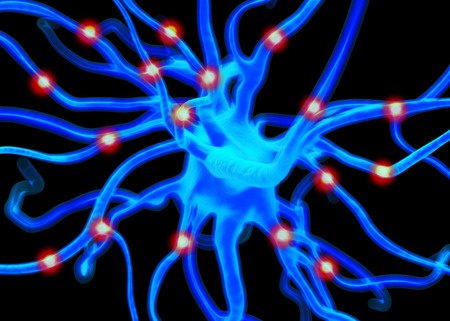Scientists investigating the little-understood senses of touch and movement have made a breakthrough that could eventually benefit people with movement disorders, spinal injuries, high blood pressure and even improve the design of robotics and prosthetics.
The mechanical senses, as they are known, are fundamentally important for the control of hearing, balance, movement and blood pressure, but far less is known about them than the other senses of sight, smell, taste, temperature and pain.
In research published today in Nature Communications, experts from the Universities of Aberdeen and Durham, in collaboration with colleagues from Academia Sinica in Taiwan, have identified a role for a protein in nerve endings involved in these mechanical senses.
Nerve endings let us sense everything from a light wind blowing our hair to knowing where our limbs are and what they are doing. They also help regulate our blood pressure and may be responsible for triggering painful muscle spasm in people with spinal injuries.
The team found that when a particular protein (ASIC3) was ‘turned off’ a series of tests revealed the nerve cells no longer detected very gentle movements, isolated muscles were more sensitive to rapid movements and fine foot placement while walking became clumsy. From this they concluded the ASIC3 protein must play a role in detecting small, rapid movements.
ASIC3 had previously been doubted by some scientists as having any role in the nerve endings detecting touch and movement. However, more sensitive and systematic ways of investigating the effect of these proteins on nerve endings were developed following an international collaboration between Professor Chih-Cheng Chen of Academia Sinica in Taiwan, Dr Robert Banks of Durham University and Dr Guy Bewick of the University of Aberdeen.
The combination of techniques that led to the discovery has been described as a major breakthrough for assessing other ‘candidate’ proteins.
Dr Guy Bewick explained: “We know which proteins detect heat, cold, pain, light, smell and taste but we don’t really know which proteins detect movement. Movement is extremely complex. It involves detecting how far, how fast, how hard and smoothness. So it may sometimes involve groups of proteins, clustered in functional units, in the same nerve ending.We, and other groups around the world, are starting to unpick what each of the proteins found in these endings might be doing.
“This is fundamental science but could result in real tangible benefits down the line. Identifying the role of individual proteins associated with such nerve endings means it could be possible to develop drugs that target and ‘turn off’ or ‘turn on’ these proteins to alleviate many disease symptoms.
“We think over-sensitive nerve endings might underlie problems in people with spinal cord injuries and cerebral palsy. Because the endings fire off too much, they set off reflex muscle contraction causing rigidity or pain. Finding selective drugs to turn them ‘down’ would prevent that reflex, without causing the weakness that current treatments produce, such as botox injections which simply paralyse muscles.
“Other researchers have found that mice without the related protein ASIC2 in their nerve endings had high blood pressure, so stimulating these channels might bring the blood pressure down. Also, a better basic understanding of movement control could improve the design of robotics and prosthetics for a wide range of applications.”
This study builds on research Dr Bewick published last year along with Professor Tom Jessell and Dr Joriene de Nooij of Columbia University, New York, which identified the role of a protein (whirlin) as important for ‘clustering’ these nerve ending proteins together.


